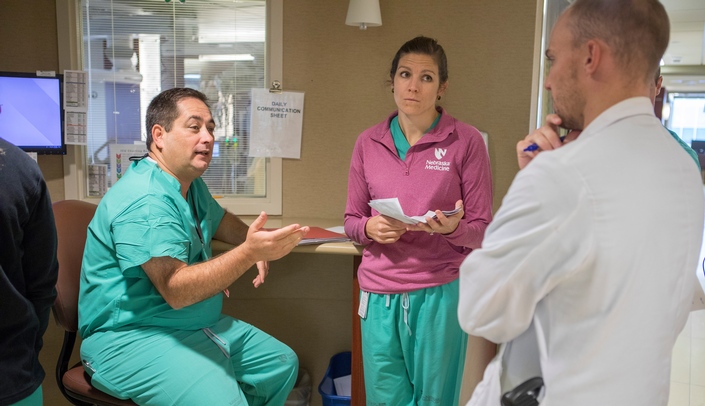Editor's Note: To celebrate the American Society of Anesthesiologist's Physician Anesthesiologist Week, January 26 – February 1, we will examine the recent leadership of our physicians to shape patient care, education and research in our institution.
The recent accomplishments within the critical care division demonstrate ongoing growth of an excellent clinical team.
For the first time ever, the National Board of Echocardiography offered an exam of special competence in critical care echocardiography. Only 420 physicians in the nation passed the exam, seven of whom are members of the critical care anesthesiology division. Two of the seven physicians who passed were fellows.
“Passing this exam is a way of demonstrating a robust competence in echocardiography,” said Division Chief Daniel Johnson, M.D. “It was a very challenging exam, so I am very proud of the faculty members and fellows who earned testamur status.”
Echocardiography performed by a critical care physician at the bedside helps to eliminate delays in appropriate diagnoses. Physicians are able to assess the entire clinical picture in real time instead of waiting for a sonographer from the echocardiography laboratory. Additionally, the division acquired new, state-of-the-art ultrasound machines in 2018 to perform these exams.
Demand for the Critical Care Anesthesiology (CCA) service continues to grow as both patient volume and the excellent reputation of the service expand. The CCA East service, which supports cardiology and cardiac surgery patients, is especially expected to grow as a result of a newly-hired cardiac surgeon and many cardiologists as various sub-specialists. The CCA West service covers a variety of ICU patients, including thoracic surgery, vascular surgery, surgical oncology, and ENT surgery.
“We have a reputation of providing excellent critical care, 24 hours a day, seven days a week,” said Dr. Johnson. “We have a wonderful team made up of skillful, intelligent, and passionate physicians and nurse practitioners.”
Division team members also celebrated their contributions to a hospital-wide quarter in 2018 with zero instances of Central Line-Associated Blood Stream Infections (CLABSI). An intensified focus on prevention of CLABSIs included removing central lines as soon as possible, enhancing dressing application, and a re-focus on sterile technique during line placement.
Multiple members of the division, who are also intensivists for the Nebraska Biocontainment Unit, were at the ready while a patient was quarantined and monitored at Nebraska Medicine for suspected exposure to Ebola virus. UNMC/Nebraska Medicine is one of three National Ebola Treatment and Education Centers (NETECH). Division members continue to prepare and train for infectious threats, including the ongoing outbreak of EVD in East Africa.
The division grew with the hiring of a nurse practitioner, Brook Veer-Sundermeier, and two physicians, Joseph Pawlowski, M.D., and William P. Mullvoy, III, M.D. In the 2019-2020 academic year, the critical care fellowship will have five fellows for the first time ever, followed by six fellows in 2020-2021.
The division focused on two clinical research trials in the last academic year. One was the Xenon study with James Sullivan, M.D., as the principal investigator. The Xenon trial aims to determine if inhaled xenon can protect against neurologic damage following cardiac arrest. A second clinical research trial, the VICTAS study, aims to determine if high doses of vitamin C can reduce the sepsis mortality rate. The division is actively applying to become a site for additional large randomized controlled trials in an effort to shine light on clinical questions in the field of critical care.
